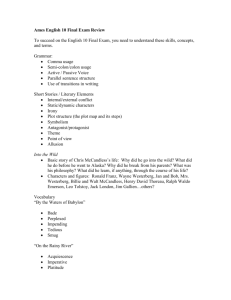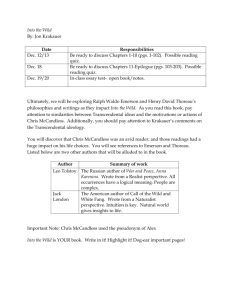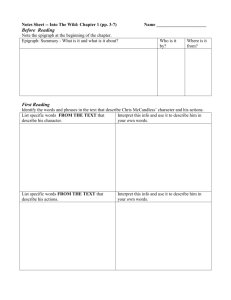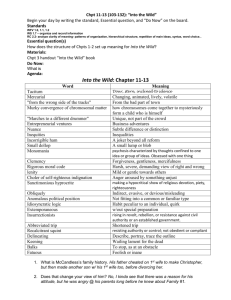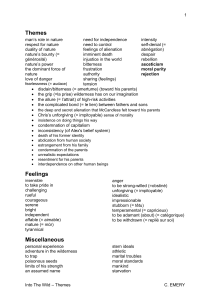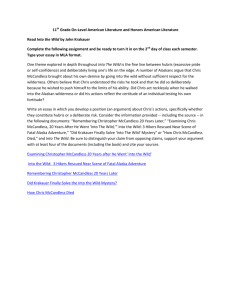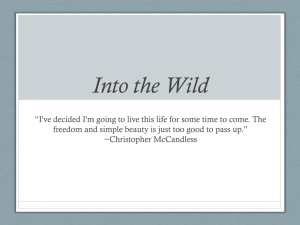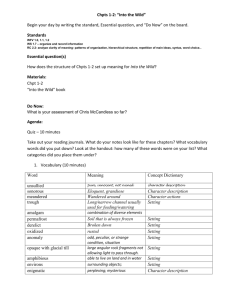Into the Wild Mark Scheme – Extended
advertisement
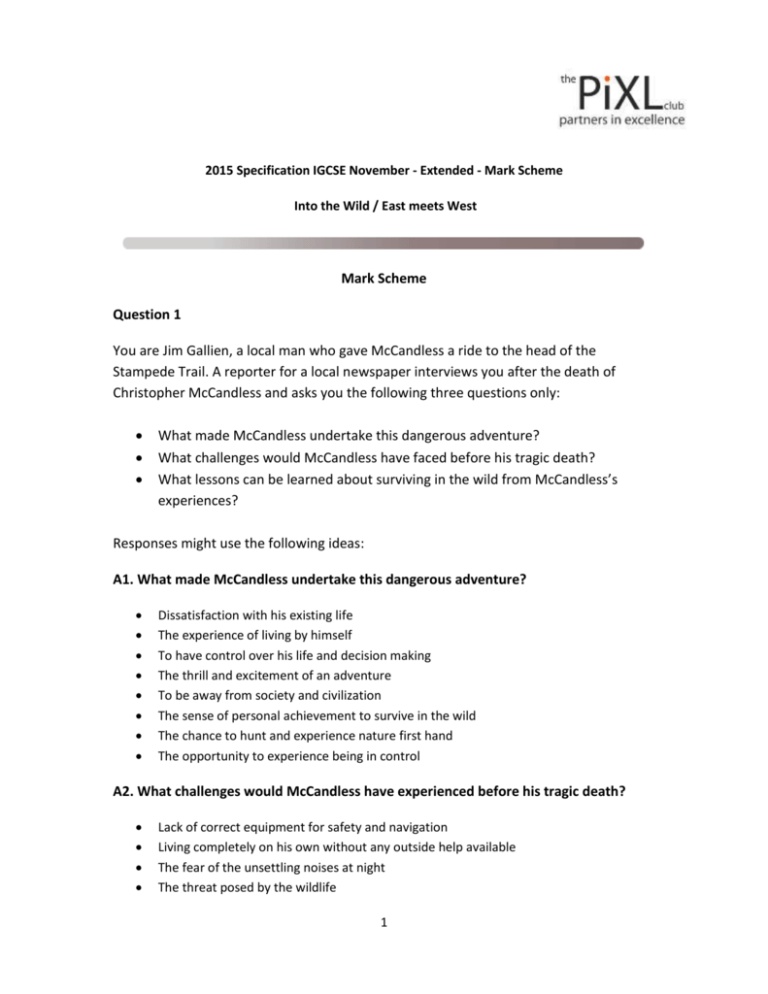
2015 Specification IGCSE November - Extended - Mark Scheme Into the Wild / East meets West Mark Scheme Question 1 You are Jim Gallien, a local man who gave McCandless a ride to the head of the Stampede Trail. A reporter for a local newspaper interviews you after the death of Christopher McCandless and asks you the following three questions only: What made McCandless undertake this dangerous adventure? What challenges would McCandless have faced before his tragic death? What lessons can be learned about surviving in the wild from McCandless’s experiences? Responses might use the following ideas: A1. What made McCandless undertake this dangerous adventure? Dissatisfaction with his existing life The experience of living by himself To have control over his life and decision making The thrill and excitement of an adventure To be away from society and civilization The sense of personal achievement to survive in the wild The chance to hunt and experience nature first hand The opportunity to experience being in control A2. What challenges would McCandless have experienced before his tragic death? Lack of correct equipment for safety and navigation Living completely on his own without any outside help available The fear of the unsettling noises at night The threat posed by the wildlife 1 Tiredness during the day from a lack of sleep Illness from eating poisonous or incorrectly prepared food The extreme cold and exposure to the elements The hostile environment and rough terrain Getting sick from lack of food and water Overcoming the strong current and cold Teklanika River A3. What lessons can be learned about surviving in the wild from McCandless’ experiences? To not travel alone and remain in contact with the outside world To not underestimate the threat posed by the nature and the wildlife The importance of taking the correct safety and survival equipment The difficulties of hunting and gathering in the wild The challenge of being so isolated from other human beings The dangers posed at different times and seasons of the year The unfriendliness of the natural world Marking Criteria for Question 1 Table A, Reading: Use the following table to give a mark out of 15 for Reading. 2 Table B, Writing: Structure and order, style of language: Use the following table to give a mark out of 5 for Writing. Question 2 (a) the surrounding environment in paragraph four. The general effect is that of ownership over a hostile land, as if there is great pleasure from ruling over a wild territory which seems to want to rise up and rebel. majesty of the savage kingdom - gives the idea of beauty combined with wildness; majesty and kingdom associated with rule and royalty ruler of the lowland valley - words evoke the idea of ownership and control snarled with tussock tundra (image) - phrase evokes a hostile animal reaction from the wildlife to its rule; the alliteration reinforces the sense of defiance sea green grasses that crowded the bog land - gives the impression of scale of grassland; colour evokes the way the grassland undulates like the sea thrashed violently - continues the idea of rebellion and defiance whipped and cracked - this phrase introduces the sound of defiance; implied violence crown of the hill - continues the royal metaphor with the hill like a castle slipped silently from sight - alliteration and personification suggests nature is furtive and like primitive beasts unable to control their animal urges (image) - this simile evokes the animalistic power and violence of the natural world; it is hostile. 3 (b) the description of the Teklanika River in paragraph six. The overall impression is of the extremely violent and unstoppable force of the river, which is likened to a beast that wakes in the winter months and wreaks havoc to the shoreline and surrounding rocks and channels. fully woken - personification evokes the idea of the river rising in force; a sleeping beast in the summer months a raging torrent - an indication of uncontrollable violence thundered north - phrase suggests power and force punched its way through the helpless canyon - continues the idea of violence; the force of the river beats against the vulnerable gaps in the rock ripped open against the banks - these words suggest the violence is increasing and is devastating forcing its way - suggests river has a mind of its own; nothing stands in its way like pure ice (image) - conveys the sheer cold of the water sunk its chilly bite (image) - the river is itself like a wild beast tried to retreat - personification of the grasses to show the power of the river turned to stone (image) - this mythological image evokes the river like the Medusa stare. Marking Criteria for Question 2 Table A, Reading: Language analysis: Use the following table to give a mark out of 10 for Reading 4 Question 3 Reading content for Question 3(a) Give 1 mark per point listed below, up to a maximum of 15. The reasons for visiting Hong Kong: Mix of different cultural traditions Vibrant modern city Impressive number of skyscrapers The International Commerce Centre The Ritz Carlton and its facilities The view from Victoria Peak Nature trails in the tropical forests The extensive birdlife The journey on the Peak tram Romantic walks along the promenade with the view The Symphony of Lights in the evenings Drinking in the bars along the promenade The restaurants serving world cuisine Shopping trips in the fashionable areas Opportunity to be seen with famous people The different experiences of Stanley market The quiet and peacefulness in the religious buildings The opportunity for reflection in the temples The culture and traditions of the Man Mo Temple Marking criteria for Question 3(b) Table A, Writing (concision, focus, use of own words): Use the following table to give a mark out of 5 for Writing. 5
